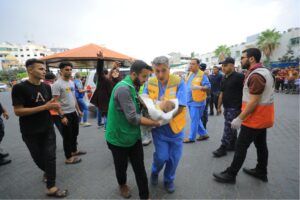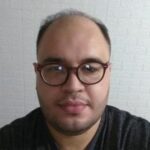
“Why have you not spoken up for us, you have forgotten us !…” (1)
These are the words of Dr. Ala Shatali, former Secretary General of the Palestinian Physiotherapy Association (1994-2004), and an Orthopaedic Physiotherapist in Gaza who volunteered to work as an emergency department triage practitioner at the start of hostilities in October 2023.
His words carry even more weight given that the professional bodies that serve Physiotherapists at both national and international level adopted positions of “neutrality” related to the events that took place in Gaza and Israel. Whilst this may have seemed like a pragmatic decision by these Physiotherapy bodies, possibly in part to avoid causing offence to part of their Physiotherapist membership, by doing so they, in effect, spoke clearly and took a side. A failure to call for a ceasefire and refusing to condemn the scenes witnessed in Gaza by the whole world appears to be a de facto endorsement of the ongoing events there. This will have been noted by Physiotherapists worldwide – most of all by Physiotherapists in Gaza.
The genesis of the Physiotherapy profession from war
Physiotherapy professional bodies have a long history of providing leadership and a voice for both physiotherapists and the patients they serve during wartime. The development of modern-day physiotherapy and rehabilitation services in the Global North takes its history from the tragic loss of life during the First World War (WW1) (2). The Physiotherapy profession was created in adversity out of the necessity to reduce the number of soldiers unfit for military service because of battle injuries. The suffering and disability during the war was unprecedented, leading to significant loss of life and horrific levels of disability. It is estimated that about 21 million soldiers were disabled during WW1 (3), and this huge number of wounded soldiers helped to advance rehabilitation in terms of the occupational and social re-integration of disabled people more generally in the USA and Europe (4).
The American Physiotherapy Association and the Chartered Society of Physiotherapy both emerged from a need for better provision and leadership of rehabilitation services for those injured after the war (5). These professional bodies campaigned for the social welfare of injured soldiers and facilitated their vocational restoration into the labour market after war. This history has helped to shape our professional and collective psyche, to caring for those on the margins of society who have little/no collective voice to change the status quo.
The effect of the war on Physiotherapy services in Gaza
The war between Israel and Hamas and the large-scale Israeli military activity in the Gaza strip has unsurprisingly created a public health crisis. At the time of writing (10th December 2024), this war has resulted in the deaths of over 44,000 people in Gaza (6), 106,000 people injured (7), and the entire 2.2million population of Gaza having severely limited access to water, sanitation and food (8). The healthcare infrastructure in Gaza has been overwhelmed by military operations, and its ability to manage the basic needs of its civilian population has been exhausted. Numerous healthcare workers in the Gaza strip have been detained by the Israeli military during this conflict (9), and Physiotherapy services in Gaza have collapsed.
Many courageous Physiotherapists in Gaza have demonstrated leadership and volunteered in emergency departments to assist the triage of trauma causalities (10). Tragically it is estimated that at least 45 physiotherapists, including Fadi Al-Wadiya from Médecins Sans Frontières (11), have been killed to date due to military operations. This is a figure which is greater than the number of qualified staff in the average physiotherapy department in the United Kingdom. It is a chilling statistic. Prior to October 7th 2023, rehabilitation services in Gaza were inadequate, with poor infrastructure and scarce training opportunities for its Physiotherapists. The conflict has now displaced an entire professional group in the Gaza strip.
Physiotherapy leadership related to Gaza
Disappointingly, Physiotherapy associations in the West appear to have shown a lack of leadership related to events in Gaza. In the United Kingdom, the Chartered Society of Physiotherapy took what could be perceived as an inconsistent approach by endorsing the World Health Professionals Alliance calling for a cessation of hostilities (12), while simultaneously adopting a policy of “neutrality” during international conflicts (13). In December 2023, the elected governing body of the Chartered Society of Physiotherapy released the following policy statement on all international conflicts:
“To ensure consistency in relation to international conflicts we will presume a position of neutrality and call upon all parties to conflict to respect international law and to do everything possible to protect healthcare workers and their patients.” (13)
The Chartered Society of Physiotherapy (CSP) has argued that it is politically engaged but non-partisan (14). But can its position of “neutrality” considering the unfolding humanitarian suffering and significant loss of life be consistent with a non-partisan position? Taking a position of “neutrality” when one side in a conflict is continuing to kill civilians and healthcare workers alike appears to be a de facto endorsement of what is happening. This position of “neutrality” was overturned 10 months later (15) after significant opposition from its membership given the inconsistency in its position compared to that taken in the Russian-Ukraine conflict (16).
The importance of consistency in justice for Physiotherapy associations
Physiotherapy professional bodies represent a diverse range of members from differing cultural, ethnic, and religious groups with an array of protected characteristics and consideration must be given to the members that they serve. It is crucial therefore that leadership and support given to Physiotherapy colleagues is consistent, in order to avoid accusations of double standards. The ongoing Russian-Ukraine conflict saw very public support and expressions of solidarity provided to Physiotherapists in Ukraine (17), and this inconsistency undermines the Chartered Society of Physiotherapy’s Equity, Diversity and Belonging strategy. This strategy calls for the opposition to discrimination, to ensuring the representation of marginalised members, and to ensuring unfairness is identified and challenged (18). The inconsistency of positions taken between the Israeli-Palestinian and Russian-Ukraine conflicts risks undermining members’ confidence in the CSP’s decision-making. There is a risk of actual or apparent corporate hypocrisy, which is linked to alienation of key stakeholders (19), in this case Physiotherapists and patients.
Physiotherapy associations have provided strong and clear leadership in the past, when advocating for justice, anti-discrimination, and the eradication of healthcare inequalities (18,20). However, their lack of willingness to call for an unequivocal ceasefire of hostilities in Gaza will affect their ability in future to build a cohesive profession for people with protected characteristics and from minoritised groups. Of relevance, a recent study of Muslim doctors and healthcare professionals in the United Kingdom found that 97% of respondents felt unfairly censored in their workplace for expressing views on the humanitarian situation in Gaza (21). These same respondents cited differences in the responses from their employers regarding the war in Ukraine (where public pronouncements were made), compared to the war in Gaza (where there was silence). Whilst the British Medical Association demonstrated leadership by voting to protect doctors who stand up for cause-related issues (including Gaza) (22), Physiotherapy associations appear to have instead marginalised those members, linked to a number of Physiotherapists cancelling their CSP memberships over this very issue. (23-27)
Using the past to look to the future
The loss of life and injuries in Gaza and Israel has caused an array of traumatic injuries requiring lengthy rehabilitation and physiotherapy interventions, and the war should be regarded as a tragedy for both sides due to the horrendous number of innocent lives lost. The collapse of the healthcare system in Gaza will further increase healthcare inequalities in this region (28), and will transcend age, gender, ethnicity and religion. Individual and community level rehabilitation will need to be interwoven into the regions infrastructure to help communities on both sides rebuild after this conflict (29). Our profession has a long history of providing leadership and a voice for Physiotherapists and patients, both during and after wars. This legacy of advocating for the voiceless and the most marginalised in society was won through moral and ethical leadership. We urge all international Physiotherapy Associations to support a permanent end to hostilities in Gaza so the process of societal rehabilitation and reconciliation can begin.
It is almost impossible to lead from sitting on the fence.
References:
- Moses R [@NHSRachaelM] Physiotherapists across the world united for humanity asking their professional organisations to do the same. Accessed 19th December 2024, available at: https://x.com/NHSRachaelM/status/1740827600719913092
- Abdul Rahim H, Arakkal Maniyat S. The rise of physical therapy: A history in footsteps. Arch med. health sci 2014;2(2):257-260.
- Bonfiglioli Stagni S, Tomba P, Viganò A, et al. The first world war drives rehabilitation toward the modern concepts of disability and participation. Eur J Phys Rehabil Med 2015;51(3):331-6.
- Reznick JS. Beyond war and military medicine: social factors in the development of prosthetics. Arch Phys Med Rehabil 2008;89(1):188-93.
- Carlo B, Alain D. A brief history of European organizations of physical and rehabilitation medicine. Am J Phys Med Rehabil 2008;87(7):592-595.
- The United Nations Office for the Coordination of Human Affairs (OCHA). Reported impact snapshot, Gaza Strip (10th December 2024). Accessed 19th December 2024, available at: https://www.ochaopt.org/content/reported-impact-snapshot-gaza-strip-10-december-2024
- United Nations Relief and Works Agency for Palestine Refugees in the Near East. UNRWA Situation Report #151 on the Humanitarian Crisis in the Gaza Strip and the West Bank, including East Jerusalem. Accessed 19th December 2024, available at: https://www.unrwa.org/resources/reports/unrwa-situation-report-151-situation-gaza-strip-and-west-bank-including-east-jerusalem
- Jamaluddine Z, Chen Z, Abukmail H, Aly S, et al. (2024). Crisis in Gaza: Scenario-based health impact projections. Report One: 7 February to 6 August 2024. London, Baltimore: London School of Hygiene and Tropical Medicine, Johns Hopkins University; Accessed 16th May 2024, available at: https://gaza-projections.org/gaza_projections_report.pdf.
- Mahase E. Gaza: BMA calls for urgent investigation into mistreatment of doctors. BMJ 2024;384:q658.
- Buckling Gaza health service turns to volunteers; Accessed 24th May 2024, available at: https://www.reuters.com/world/middle-east/buckling-gaza-health-service-turns-volunteers-2023-10-30/
- Médecins Sans Frontières. MSF outraged and condemns killing of sixth staff member in Gaza. Accessed 19th December 2024, available at: https://www.doctorswithoutborders.ca/msf-outraged-and-condemns-killing-of-sixth-staff-member-in-gaza/.
- World Physiotherapy Association. World Physiotherapy and WHPA statements on the conflict in Israel and Gaza. Accessed 28th May 2024, available at: https://world.physio/news/world-physiotherapy-and-whpa-statements-conflict-israel-and-gaza
- Chartered Society of Physiotherapy. December 2023 CSP chair’s statement on Gaza and Israel; Accessed 17th November 2024, available at: https://www.csp.org.uk/system/files/documents/2023-12/key_decisions_council_7th_december_2023.pdf
- Chartered Society of Physiotherapy. Corporate Strategy Valuing Physiotherapy 2023-2027. Accessed 19th December 2024, available at: https://www.csp.org.uk/system/files/documents/2022-10/CSP%20Corporate%20Strategy%202023-2027.pdf
- Chartered Society of Physiotherapy. Updated CSP chair’s statement on Gaza and Israel. Accessed 20th November 2024, available at: https://www.csp.org.uk/news/2023-10-19-csp-chairs-statement-gaza-israel
- Chartered Society of Physiotherapy. Motions to be debated at Chartered Society of Physiotherapy Annual Representative Conference 2024. Accessed 18th December 2024, available at: https://pogp.csp.org.uk/system/files/documents/2024-06/arc_2024_-_motions.pdf
- Chartered Society of Physiotherapy. CSP offers free membership to refugee physiotherapy staff and students; Accessed 17th May 2024, available at: https://www.csp.org.uk/news/2022-03-23-csp-offers-free-membership-refugee-physiotherapy-staff-students
- Chartered Society of Physiotherapy. Chartered Society of Physiotherapy Equity, Diversity and Belonging Strategy. Accessed 16th May 2024, available at: https://www.csp.org.uk/frontline/article/equity-diversity-belonging-0
- Wagner T, Korschun D, Troebs C. (2020) Deconstructing corporate hypocrisy: A delineation of its behavioural, moral, and attributional facets. J Bus Res 2020;114:385-394.
- American Physical Therapy Association. Diversity, Equity, and Inclusion Action Plan. Accessed 17th May 2024, available at: https://www.apta.org/contentassets/c2194a9a1fe240d28cc3649a65067c63/apta_dei_action_plan.pdf.
- Mahase E. Gaza: Muslim doctors in UK feel censored and targeted for expressing concern over humanitarian crisis. BMJ 2024;385:q805.
- The Doctor. BMA votes to protect medical professionals from GMC sanctions for activism. Accessed 19th December 2024, available at: https://thedoctor.bma.org.uk/articles/health-society/bma-votes-to-protect-medical-professionals-from-gmc-sanctions-for-activism/.
- Sidhanee A [@Abu Sidhanee] posted: I’ve cancelled my 20+ year @thecsp membership – I’ve spent my career working with children & will not be part of a ‘union’ who won’t call for a ceasefire when this & worse is happening to them & who has said so little when so many physios have been killed at: https://x.com/thatphysioabu/status/1745479837257552282?s=51&t=Cz8zqXKxvACjViqMHb01GA
- Batchelor E [@Ele Batchelor] posted: Cancelled my 5yr @theCSP membership due to actions of current council on Palestine/Israel. Dedicated to rehab and “never again” I won’t pay to a union that made new policy at this time to stay silent on genocide and refuses to act in solidarity with colleagues in their suffering at: https://x.com/eleb09609750/status/1781734681941033308?s=51&t=Cz8zqXKxvACjViqMHb01GA
- Rashid S [@shafiq rashid] posted: Wow! this is the defining moment for me, time to cancel my @thecsp membership and join @unisontheunion this weekend, the latter also covers professional liability insurance at: https://x.com/shafiqrashid11/status/1833969900437618878?s=51&t=Cz8zqXKxvACjViqMHb01GA
- Respiratory BHJ [@BHJ Respiratory] posted: Ah I missed that. Sorry. But it’s a genuine consideration. I’ve had discussions about this in three separate spaces just this week. Certainly between the lack of stance on Gaza and rounded off with the gagging order recently released- I’m no longer proud to say I’m a member at: https://x.com/bhjrespiratory/status/1785051812912852993?s=51&t=Cz8zqXKxvACjViqMHb01GA
- Shoiab [@Shoiab] posted: Sorry to hear you having to step away from the CSP, but hopefully you move over to a more representative union better aligning to values the CSP no longer does. You are not alone. The list is growing … 1/2 at: https://x.com/shoiab1/status/1785055926338109524?s=51&t=Cz8zqXKxvACjViqMHb01GA
- Hassan F, Manjra S. The global health community must call for an immediate ceasefire and unrestricted humanitarian aid in Gaza. BMJ 2024;385:q782.
- Mataz E (2010) Introduction to trauma rehabilitation after war and conflict. In: Trauma rehabilitation after war and conflict – Community and Individual perspectives.
Authors

Uzo Ehiogu
Uzo Ehiogu is an NHS Clinical Teaching Fellow at the Royal Orthopaedic Hospital in Birmingham. He is also a Consultant in Musculoskeletal Physiotherapy and rehabilitation in the private sector. He is a musculoskeletal physiotherapist and advises clinicians and organizations on performance optimisation for occupational fitness and musculoskeletal rehabilitation. His current clinical practice straddles the divide between athletic performance and musculoskeletal rehabilitation in minority sports in addition to his NHS rehabilitation work. Additionally, he is also involved in humanitarian work supporting the development of physiotherapy services and clinical expertise in conflict zones including Ukraine and Palestine. He is a former Royal Marines Commando.
Uzo has both Masters of Science Degrees in Neuromusculoskeletal Physiotherapy and Strength and Conditioning and Bachelor Degrees in Applied Sports Science and Physiotherapy. He is a full member of the UK Musculoskeletal Association of Chartered Physiotherapists (MACP) and is a Professional Doctorate Candidate in Strength and Conditioning and Rehabilitation. Uzo is also an UKSCA Accredited strength and Conditioning Coach (ASCC).

Basman Aldirawi
Basman Aldirawi Clinical Physiotherapist (Palestinian Territories) (also published as Basman Derawi) is a physiotherapist and a graduate of Al-Azhar University in Gaza in 2010. Inspired by an interest in music, movies, and people with special needs, he contributes dozens of stories to the online platform We Are Not Numbers.

Osman Ahmed
Dr. Osman Ahmed is a Physiotherapist at University Hospitals Dorset NHS Foundation Trust (Poole, England) and is the Physiotherapy Lead and Classification Lead for Para Football at the Football Association, England. He trained as a Physiotherapist at the University of Nottingham (England), before undertaking his Postgraduate Diploma in Sports Physiotherapy and subsequently his PhD at the University of Otago (New Zealand) on concussion in sport.. He teaches on the FA’s Advanced Trauma Medical Management course and also holds the position of Visiting Senior Lecturer at the University of Portsmouth (England).
He holds several governance roles within Para Sports federations, including Medical & Sports Science Director at the International Federation of Cerebral Palsy Football, Medical Unit Co-Lead at the Para Football Foundation, and Medical Committee member of the International Blind Sport Association. He is a Co-Chair of the Concussion in Para Sport Group and is an Associate Editor at the British Journal of Sports Medicine and at BMJ Open Sport & Exercise Medicine.
Declaration of interests
We have read and understood the BMJ Group policy on declaration of interests and declare the following interests: none.